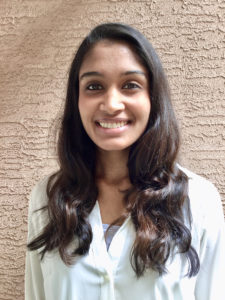
Harini Suresh leads a life that is dedicated to the service of others and is forged by a passion for holistic health, giving back to the community, and advocating for underserved populations in DFW. As an Albert Schweitzer Fellow, Harini will serve the residents of the Mullins Transitional House, a safe home for female veterans transitioning from active service to civilian life. We are grateful for Harini’s compassion and dedication to our community.
An Interview with Harini Suresh: Increasing Health Literacy for Female Veterans
Can you tell us a little bit about your background and what has led up to this moment in your career?
As I enter into my final year of medical school, I have built a strong foundation of knowledge and skills in the realm of health care that I wish to use to serve my immediate Dallas community. Growing up attending a Sunday School that engaged in community service every six weeks, service has been ingrained as a priority in my life. It led me to pursue a career that centers on direct service to others. As a practicing physician, I aim to build my own practice serving a consistent community. I hope to help patients over the span of years overcome medical challenges and move towards leading a healthy lifestyle. Until then, I’d like to create, lead, and forge a longitudinal service project in my last year of medical school benefitting an underserved population in Dallas, plugging into my passion for holistic health and giving back to the community that has offered me so much.
Service has been ingrained as a priority in my life.
Harini Suresh
What is the main goal of your project?
My project serves the residents of the Mullins Transitional House in Lewisville, a safe home for female veterans transitioning from active service to civilian life. I built my project around this unique and frequently overlooked population with the goal of increasing health awareness and literacy through monthly workshops and individual goal-setting sessions. The workshops cover topics including women’s health, mental health, preventive health, and financial health literacy, while providing information for community resources and health care access. By increasing health awareness and meeting with women individually to set individualized health goals, I hope to improve health literacy, health care access, and overall health in female veterans.
I built my project around this unique and frequently overlooked population with the goal of increasing health awareness and literacy through monthly workshops and individual goal-setting sessions.
Harini Suresh
What does being an Albert Schweitzer Fellow mean to you?
“The purpose of human life is to serve, to show compassion, and the will to help others.” Schweitzer’s quote and his example of service to mankind have sustained throughout the years through the Schweitzer Fellowship. I feel honored and humbled to serve my community with his mission in mind. He was a renaissance man – a distinguished theologian, accomplished musician, and physician – and used his broad understanding of humanity to give back to society. A music major and future physician myself, I feel inspired by his example, and hope to use my diverse experiences to serve others.
What role do you think philanthropy plays in supporting research and innovation?
From a health care perspective, focusing philanthropic efforts on communities in need – those lacking access to health care, uninsured populations – is incredibly important now more than ever. The Schweitzer Fellowship provides financial resources, organizational support, and a wide network of well-connected past fellows, benefactors, and community leaders as we plan, construct, and execute a community-centered project. However, the work doesn’t stop there – constant reflection, outcome measurements, and sustainability are key and emphasized as part of the Fellowship. Collecting and synthesizing valuable data to identify positive change can be utilized for the long-term benefit of these populations in need.
The Legacy of the Albert Schweitzer Fellowship
The philosophy that ASF champions aligns with the principles the Foundation has represented since its founding. Both ASF and the Foundation were established during World War II to develop leaders in service and inspire great citizenship through philanthropy. ASF was founded by Helene Bresslau Schweitzer and Albert Schweitzer in 1940. During the same time period, Southwestern Medical Foundation instituted the Ho Din Award.
Through the Ho Din Award, the highest honor bestowed on a graduating medical student from UT Southwestern, the Foundation has supported students who exemplify knowledge, understanding, and compassion. The Fellowship Program personifies these values, instilling a life-long philosophy of compassionate patient care, and paving the way for better health for all.
The Fellowship is open to students in eight local universities, including Baylor University, Southern Methodist University, Texas Christian University, Texas Woman’s University, University of Dallas, University of Texas at Arlington, University of Texas at Dallas, and UT Southwestern Medical Center.